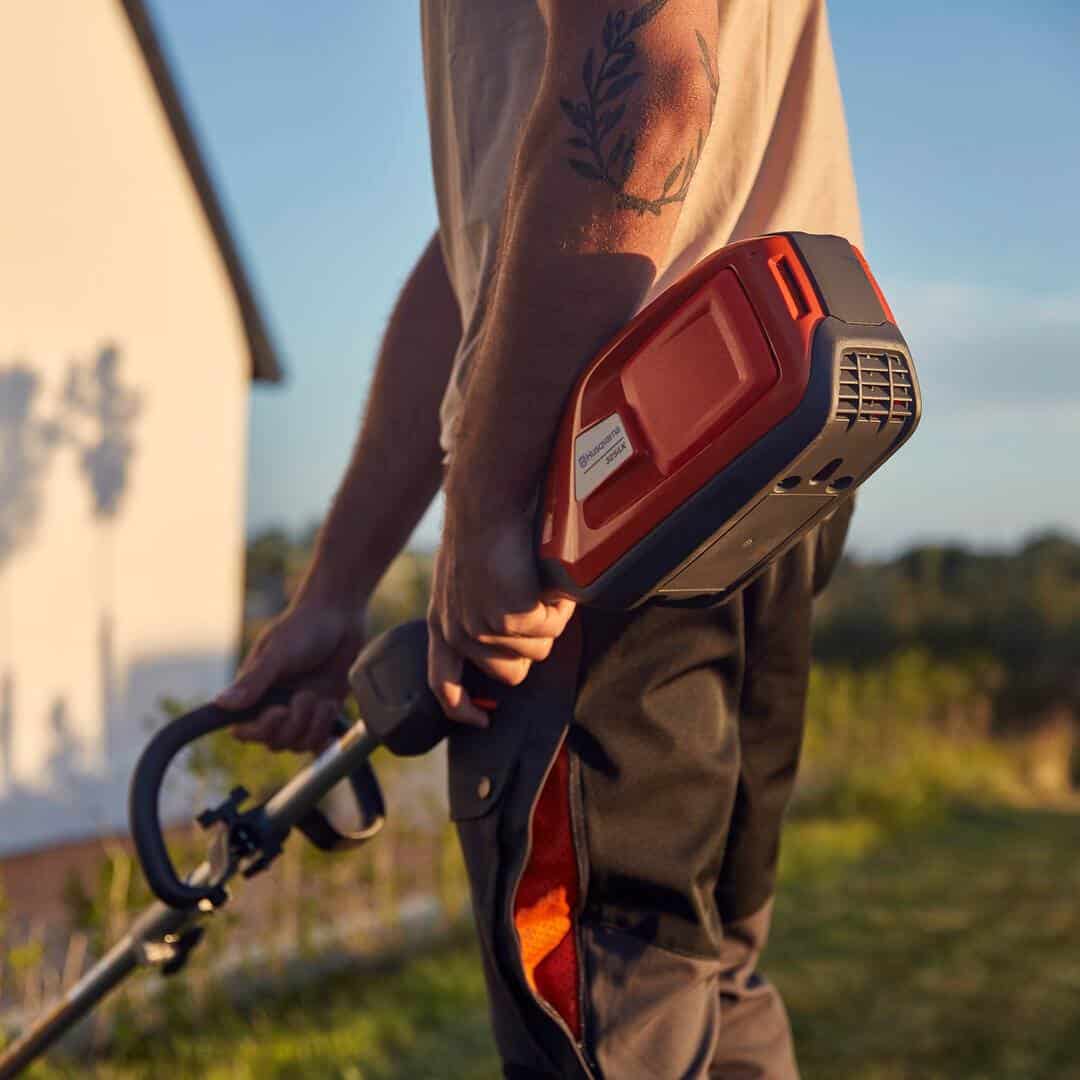Hello mate!
Choosing the right trimmer for your lawn can feel like navigating a maze, especially when it comes to deciding between a blade trimmer and a string trimmer. I completely understand this predicament, having been there myself, and armed with the fact that blade trimmers are better suited for thicker vegetation while string trimmers work best on lighter vegetation.
This blog post aims to shed some light on these two types of machines by outlining their pros and cons along with personal insights gained from my own experiences. So let’s get ready to find the perfect match for your yard!
Contents
Blade Trimmer vs String Trimmer: Comparison Table
Understanding the key differences between blade trimmers and string trimmers can help you make an informed decision for your specific lawn care needs. Here’s a comparison table outlining their distinct characteristics.
| Blade Trimmer | String Trimmer | |
|---|---|---|
| Cutting Instrument | Blades | Monofilament String |
| Power | More powerful; suitable for thicker vegetation | Less powerful; ideal for lighter vegetation |
| Edging Capability | Limited to horizontal cutting | Can perform both horizontal and vertical edging |
| Durability | More durable with steel driveshafts | Less durable with plastic drive cables |
| Workload Capacity | Greater workload capacity; can handle thicker vegetation | Workload capacity depends on the thickness of the trimmer line |
| Maintenance & Repair | Blades can be replaced, but requires more maintenance | Trimmer line can be easily replaced; requires frequent replacements |
This comparison table should help guide your decision-making process when choosing between a blade trimmer and a string trimmer. Both have their unique benefits and drawbacks, so it’s essential to consider your yard’s specific needs.
Read more: Is String Trimmer Line Biodegradable? Uncover the Answer
Pros and Cons of Blade Trimmers
Blade trimmers are suitable for thick grass, brush, and saplings; they are durable and long-lasting, making them more powerful for heavier vegetation. However, they can be more expensive, require more maintenance, and may cause injuries.
Pros: Suitable for thick grass, brush, and saplings, durable and long-lasting, more powerful for heavier vegetation
A blade trimmer is the top choice for tough jobs. It cuts through thick grass, brush, and small trees with ease. The power of a blade trimmer makes heavy work feel light. Your lawn will look clean and neat in no time.
This tool also has a strong build that lasts for years. With a blade trimmer, you won’t need to buy a new one often. It stands up well against rough use too. These facts make it clear – for hard tasks, you need a blade trimmer!
Cons: Can be more expensive, requires more maintenance, may cause injuries
Blade trimmers can hit your wallet harder. They cost more than string trimmers. You also need to keep them in good shape. This means more checks and fixes for them. If not used the right way, they might hurt you.
Their sharp blades can cause cuts and scrapes if you’re not careful! So always use care when handling blade trimmers.
Read more: What Type Of Fuel Is Used For The String Trimmer?

Pros and Cons of String Trimmers
String trimmers have the advantage of being versatile for lighter vegetation, with an adjustable trimmer line and a lower cost than blade trimmers.
Pros: Versatile for lighter vegetation, adjustable trimmer line, less expensive
String trimmers have several advantages when it comes to dealing with lighter vegetation in your yard. They are highly versatile and can easily navigate around obstacles like trees or fences.
The adjustable trimmer line allows you to customize the cutting height according to your preferences, giving you more control over the trimming process. And best of all, string trimmers tend to be less expensive compared to blade trimmers, making them a cost-effective choice for maintaining your lawn.
So if you have mostly lighter vegetation in your yard and want a budget-friendly option, a string trimmer might be the perfect fit for you.
Cons: Less durable, may require more frequent replacements, less powerful for thicker vegetation
The cons of string trimmers are that they are not as durable as blade trimmers. This means that they may need to be replaced more often. Additionally, string trimmers are less powerful when it comes to cutting through thicker vegetation like thick grass or brush.
So if you have a lot of thick plants in your yard, a blade trimmer might be a better option for you. It’s important to consider these factors before deciding which type of trimmer is right for your yard.

Determining the Right Type for Your Yard
To determine the right type of trimmer for your yard, consider the thickness and type of vegetation, assess your trimming needs and preferences, and evaluate your budget and maintenance capabilities.
Consider the thickness and type of vegetation in your yard
When deciding between a blade trimmer and a string trimmer for your yard, it’s important to think about the thickness and type of vegetation you have. If you have tall, thick grass, brush, or saplings in your yard, a blade trimmer may be the better choice.
Blade trimmers are more powerful and can handle heavier vegetation. On the other hand, if you have lighter vegetation like weeds or small bushes, a string trimmer might be more suitable.
String trimmers are versatile and adjustable for different types of vegetation. So before making your decision, take a good look at your yard and consider what kind of plants you need to cut down.
Assess your trimming needs and preferences
To choose the right trimmer for your yard, it’s important to assess your trimming needs and preferences. Consider the thickness and type of vegetation in your yard. If you have thick grass, brush, or small saplings that need to be trimmed, a bladed trimmer might be the best choice for you.
On the other hand, if you mainly have lighter vegetation like grass and weeds, a string trimmer would be more suitable. Think about how often you’ll be using the trimmer and what features are important to you.
Do you prefer a more powerful tool or one that is easier to handle? Evaluate your budget and maintenance capabilities as well. Keep in mind that bladed trimmers tend to be more expensive and require more maintenance compared to string trimmers.

Evaluate your budget and maintenance capabilities
Before choosing between a blade trimmer or a string trimmer, it’s important to consider your budget and maintenance capabilities. Take into account how much you are willing to spend on a trimmer and the ongoing costs for maintenance.
Blade trimmers tend to be more expensive upfront but can be more durable in the long run. However, they may also require more regular maintenance compared to string trimmers. On the other hand, string trimmers are generally less expensive but may not last as long and might need more frequent replacements.
So, assess your budget and determine how much you can afford for both initial purchase and upkeep before making a decision.
Choosing the Best Trimmer for Your Yard
When it comes to choosing the right trimmer for your yard, consider the type of vegetation and your trimming needs. Blade trimmers are great for thick grass and heavy vegetation, while string trimmers are best for lighter plants.
Think about your budget and maintenance capabilities too. So, make an informed decision based on what works best for you and keep your yard looking neat and tidy!
FAQs
1. What is the difference between a blade trimmer and a string trimmer?
A blade trimmer uses sharp metal blades to cut through dense vegetation, while a string trimmer uses a spinning nylon string to cut grass and light weeds.
2. Which is better for thick or heavy-duty trimming tasks, a blade trimmer or a string trimmer?
For thick or heavy-duty trimming tasks, a blade trimmer is generally more effective as it can handle tougher materials with ease.
3. Can I use a blade trimmer on delicate plants or flowers?
No, using a blade trimmer on delicate plants or flowers may cause damage. It’s best to use a string trimmer for trimming around delicate areas to avoid accidentally cutting them.





